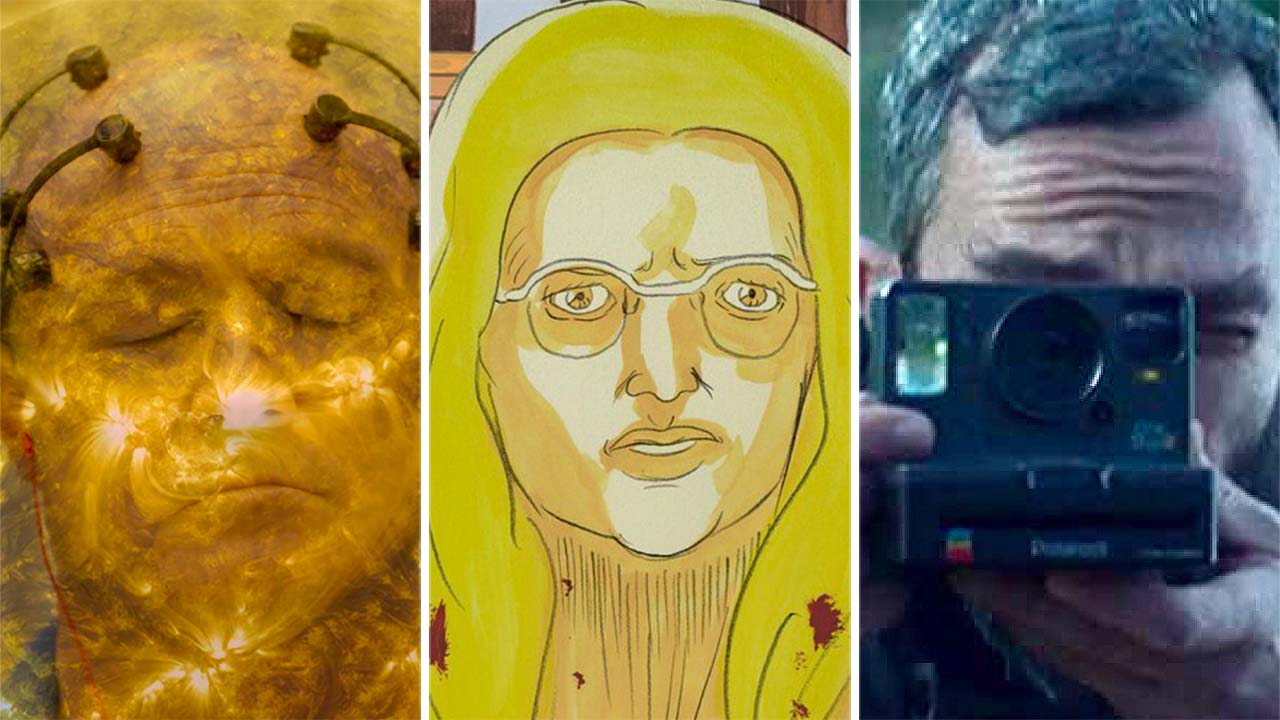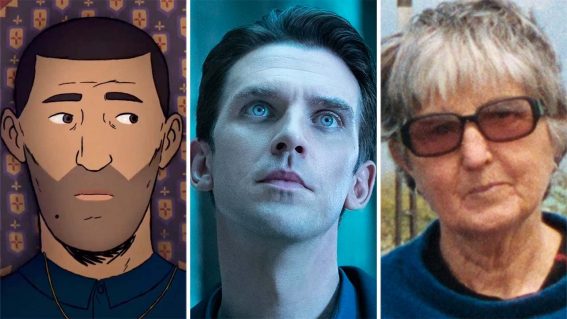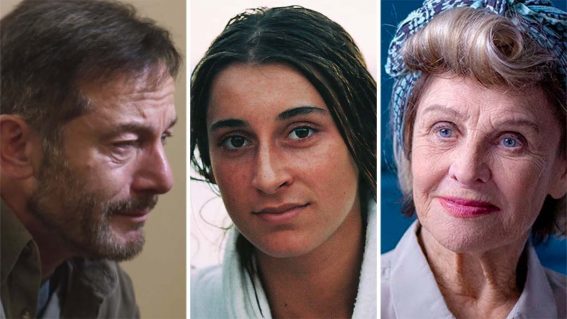NZIFF 2021 mini-reviews (A – D)

Our writers have been watching a ton of films playing as part of Whānau Mārama: New Zealand International Film Festival 2021.
This year’s festival features plenty of gems (even if they might not all be available throughout Aotearoa). Our team of keen reviewers has been busy watching, and rendering their verdicts.
All 2021 mini-reviews:
Latest reviews | A – D | E – J | K – M | N – R | S – Z
See also:
* All our Q&As with this year’s filmmakers
* All our other NZIFF coverage
About Endlessness
A stirring collection of vignettes pondering the tragic, extraordinary fate of being alive. Swedish master Roy Andersson shines here in his singular pallid way, constructing his scenes with tenderness and profundity. Banal yet ever compelling—an astonishing 78-minute portrait of existence. AMANDA JANE ROBINSON
Swedish director Roy Andersson once again sheds his pale grey light on the secret lives of the dull and down’n’out, with this latest batch of delightfully dour vignettes. From depressed dentists to a faithless Father, there’s always beauty to be found in the boring.
MATTHEW CRAWLEY
After Love
While the story of a suddenly widowed woman uncovering her late husband’s unsettling secret is hardly a new one, After Love, the debut feature from English-Pakistani film-maker Aleem Khan, goes against the odds to tell it in a way that is entirely new. Following Mary Hussein, a white brit who converted to Islam at a young age to be with her husband, Khan breaks the mold with both atypical subject matter and soft, subtle approach to a situation usually ripe with melodrama. With a truly extraordinary performance from Joanna Scanlan (The Thick of It) at its heart, After Love finds complexity and compassion in a tale that usually ends up a tragedy. KATIE PARKER
Watching duelling emotions play across Joanna Scanlan’s face as she pieces the puzzle together in a devastatingly accomplished performance as Mary/Fahima, an English Pakistani middle aged woman whose recently deceased husband kept secrets of the whole-other-family-across-the-ditch type, is just so exquisitely uncomfortable. Not afraid to linger his lens, Writer/Director Aleem Khan observes Mary’s grief stricken curiosity and simultaneous enlightenment with a non-judgemental eye, exploring the intricacies of duality with elegantly framed care across all facets of this film. SARAH VOON
One of those frustrating stories that hinge on the main character holding onto a bad lie for a painfully long time. It’s a great platform for Joanna Scanlan, dishing out a rock-solid performance that flawlessly conveys the understated pain of a woman mourning the loss of her beloved husband while simultaneously discovering he’s kind of a piece of shit who secretly had a lover and a son. However, when she meets them, it’s hard not to think the drama’s manufactured by a ruse that feels unrealistic, and that this would all be over sooner with an honest conversation and a big ol’ cry. LIAM MAGUREN
All Light, Everywhere
Perhaps my brain has simply melted from the various trials and tribulations of the past few months, but All Light Everywhere, a documentary/visual essay about surveillance technology, and in particular police body cams, was the kind of combination of boring, tedious and overly cerebral that makes me feel like I’m going insane when I look it up later to find everyone else loved it. Told with monotone narration by someone who introduces themselves as “an actor who will give life to the whole at the centre of this film” All Light Everywhere relies on its audience’s single minded thirst for knowledge to overcome the many obstacles it sets to pay attention. It is, in my opinion, a shame as the subject matter seems important—but I will never know because I just could not for the life of me focus on this unbelievably dull film. KATIE PARKER
One of those docos that ponders more than it argues, but some of the ponderings are vital. Could feel my mind pry open with the staggering connection between flawed visual science of the past and “blind spots” in current surveillance technology. Carries an original and well-realised meta mood suited to the overall idea of perception as an abusable act of power (though I could have done with fewer crossfades and less chaos jazz). LIAM MAGUREN
Apples
This stylishly spare debut film by Greek writer/director/producer Christos Nikou with its sombre, diffused lighting and pleasing palette, explores the often solitary process of dealing with grief and loss. Protagonist Ari succumbs to the widespread pandemic of random incurable amnesia and is referred to a facility set up specially to offer some new memories to the unfortunates whose loved ones don’t claim them. Gently paced and laced with black humour amongst the confusion, even the chicest French navy pyjamas and a singular purpose—to complete the New Identity programme with its socially dubious prompts and old school tasks, can’t dispel the ache in the air. SARAH VOON
Low-key take on a big idea follows a new case of amnesia in a wave mysteriously sweeping through Greek society. For some of those afflicted, as seen here, there’s no family to be reunited with to help reacquaint them with their past. Following one man as he participates in a state programme to bed in a new identity, Apples remains gently opaque until the lead’s background is confirmed in a moving ending. STEVE NEWALL
‘The Greek Weird Wave’ has been a thing for twenty years now, and maybe this speaks to my lack of exposure to it, but I couldn’t shake the feeling of ‘Lanthimos-lite’ while watching Christos Nikou’s Apples. Its central idea, concerning a global pandemic (gulp) that causes amnesia, is a fertile one, but he never seems quite sure what to do with it—until, that is, it reaches its genuinely moving conclusion. More than anything it made me hanker for a good Braeburn. TONY STAMP
Babi Yar. Context
My first reaction was that I can’t believe this footage exists, from Ukrainians throwing roses at the feet of German troops, to thousands of people massing to watch Nazis publicly hanged, and in between, the slow, tortuous buildup to the murder of 33,771 Jews in the initial massacre at Babi Yar ravine. Much of the Holocaust seems surreal in hindsight—one of many examples here is the way people in 1941, including children, were already very casual about corpses laying in the street. It’s extremely tough viewing, obviously, but all the more necessary for it. TONY STAMP
Bad Luck Banging or Loony Porn
This is what the festival is all about—a film unlike any you’ve ever seen before from a country whose cinema we rarely get to see in Aotearoa. Oh and it has uncensored porn in it, too. Due to just how absurdist this is it’s hard to recommend to everyone, but if you get onboard with its wild wavelength it’s both delightfully entertaining and also a powerful expression of rage. DANIEL RUTLEDGE
Unsimulated sex at the beginning, shots of everyday Romanian life (interspersed with the early consequences of said sex leaking online), followed by an extended Adam Curtis-y archival doco section and then a farcical trial culminating in one hell of an ending—Bad Luck Banging or Loony Porn swings for the fences, if imperfectly. Truly a “you probably haven’t seen this before” experience, but probably not one to take prudish parents along to… STEVE NEWALL
Sensitive viewers may be tempted to leave during the opening seconds of this film, literally—it does not muck around in its attempt to provoke. What follows is split into three distinct chunks, functioning as a drama smuggled into a COVID-era fly-on-the-wall doco, a visual essay on a wild array of topics, and finally a third act that descends into farce while tying all its themes together beautifully. Thought-provoking, occasionally shocking, highly recommended for those after something fresh. TONY STAMP
Crock of Gold: A Few Rounds with Shane MacGowan
Pogues frontman and Irish national treasure Shane MacGowan’s life is shared here in the most fitting way possible—with MacGowan telling his stories (and proving he is still not taking any shit). Not to a formal interviewer, but folks like Bobby Gillespie and Johnny Depp (both, fittingly, in pubs) while Gerry Adams visits MacGowan at home to hear his recollections. A winning way of capturing conversations about a life too big to confine to the screen, aided by director Julien Temple’s use of era-specific animation to stretch beyond the spoken word (Fear and Loathing illustrator Ralph Steadman’s depiction of MacGowan losing his mind on tour in New Zealand is a parochial highlight). STEVE NEWALL
Cryptozoo
A hypnotically trippy love letter to underground comics and cult animated cinema of the sixties and seventies. Sadly, a lot of what it’s trying to say about commodification, white saviours, and sixties utopianism gets lost in the Jurassic Park of it all, but far out if it doesn’t look absolutely stunning from start to finish. Bonus points for Michael Cera getting mauled by a unicorn. AMELIA BERRY
A lush and psychedelic fairytale about the misguided project of Utopia. A bit corny? Yes—but the plot isn’t really why you’re here. Come for the Shaw/Samborski animation—stay for the John Carroll Kirby soundtrack. Spark one up and let it wash over ya. RACHEL ASHBY
Bit of a case of style over substance, but certainly one to experience if this sort of thing interests you. The nature-vs-human-intervention storyline is nothing new, pinned down by some fairly rote plot points and fine-but-forgettable characters. However, the storyboard-on-acid approach suits its ’60s counterculture fantasy world superbly, allowing it to take wild visual swings every minute. Fantastic music, too. LIAM MAGUREN
All 2021 mini-reviews:
Latest reviews | A – D | E – J | K – M | N – R | S – Z














